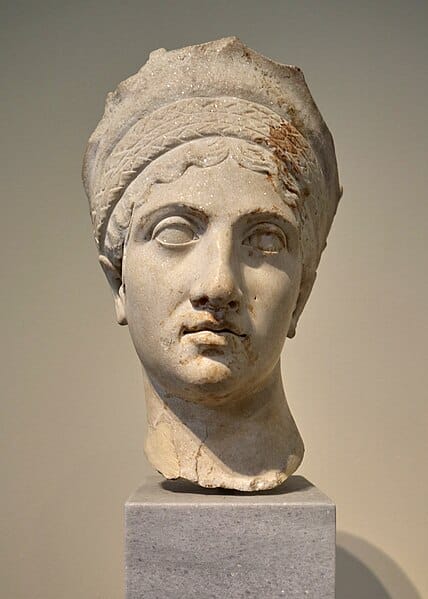Pompeia Plotina was an influential Roman empress who lived during the 2nd century AD. She was the wife of Emperor Trajan and played a significant role in Roman politics and society during her husband’s reign. Despite her importance, little is known about her life, and many of the details surrounding her story remain shrouded in mystery.
Pompeia Plotina was born in the Roman province of Nemausus (modern-day Nîmes, France) in the year 70 AD. She was the daughter of Lucius Pompeius and Plautia, a prominent family in the region. Little is known about her childhood, but it is believed that she received a good education and was well-versed in literature, philosophy, and other subjects.

In 100 AD, Pompeia Plotina married Marcus Ulpius Traianus, who would later become Emperor Trajan. The couple had no children, but they were said to have had a happy and loving marriage. Pompeia Plotina was known for her intelligence and her devotion to her husband, and she played an important role in his political career. She was highly respected by the people of Rome, and her influence was felt throughout the empire.
Key Takeaways
- Pompeia Plotina was an influential Roman empress who played a significant role in Roman politics and society during her husband’s reign.
- Little is known about her early life and background, but she was born into a prominent family and received a good education.
- Pompeia Plotina was known for her intelligence and her devotion to her husband, and she played an important role in his political career.
Early Life and Background
She was born into a wealthy and influential family, and her father, Lucius Pompeius, was a senator and consul. She was taught to read and write in both Latin and Greek, and she was also trained in music, art, and literature.
After her father’s death, Plotina married Trajan, who would later become the Emperor of Rome. The marriage was arranged by Trajan’s father, who was a friend of Plotina’s family. Despite the arranged nature of their marriage, Trajan and Plotina had a strong and loving relationship. They had no children of their own, but they adopted a young boy named Hadrian, who would later become Emperor after Trajan’s death.
Throughout her life, Plotina was known for her intelligence, kindness, and generosity. She was deeply involved in charitable work, and she used her wealth and influence to help those in need. Pompeia Plotina’s early life and background were marked by privilege and opportunity but also by a strong sense of duty and compassion.
Marriage to Emperor Trajan
Influence on Trajan
As an empress, Pompeia Plotina was known for her intelligence and political acumen. She was deeply involved in the administration of the empire and advised her husband on a wide range of issues, from military strategy to social policy. In particular, she was a strong advocate for the rights of women and children and worked to improve their legal status within the empire.
Role as Empress
Pompeia Plotina was also known for her patronage of the arts and her support for intellectual pursuits. She was a great lover of literature and poetry and was known to have corresponded with many of the leading writers and thinkers of her time. In addition, she was a generous benefactor of public works and monuments and was responsible for the construction of several important buildings and civic projects.
Pompeia Plotina was widely respected and admired. She was known for her kindness, her wisdom, and her unwavering devotion to her husband and the empire. Her influence on Trajan’s reign was significant, and she played a key role in shaping the policies and direction of the Roman Empire during one of its most prosperous and successful periods.
Political Influence and Patronage
Support of Public Works
Pompeia Plotina had a significant influence on public works projects during his reign. She was known for her support of the construction of public buildings and infrastructure, such as aqueducts, bridges, and roads. Her patronage helped to improve the quality of life for citizens of the Roman Empire.

Source: Erik Cleves KristensenBearbeitung (Ausschnitt): Christoph Waghubinger (Lewenstein), CC BY 2.0 https://creativecommons.org/licenses/by/2.0, via Wikimedia Commons
Advocacy for Education
Pompeia Plotina was also a strong advocate for education and intellectual pursuits. She sponsored the education of young women and encouraged the study of philosophy and literature. Her patronage of scholars and writers helped to promote the arts and sciences during her time.
Involvement in Succession
Pompeia Plotina played a role in the succession of Emperor Trajan. She was instrumental in securing the adoption of Hadrian as Trajan’s heir, which ensured a peaceful transition of power after Trajan’s death. Her political influence and patronage helped to shape the course of Roman history.
Overall, Pompeia Plotina’s political influence and patronage had a significant impact on the Roman Empire during her time. Her support of public works, advocacy for education, and involvement in succession are just a few examples of her contributions to Roman society.
Death and Legacy
Deification
Pompeia Plotina passed away in 121 AD. She was buried in the Mausoleum of Hadrian, which was later renamed the Castel Sant’Angelo. After her death, her husband. Emperor Hadrian declared her a goddess and ordered the construction of a temple in her honor in Nîmes, France. The temple was completed in 139 AD and was known as the Maison Carrée.
Pompeia Plotina was also worshipped as a goddess in other parts of the Roman Empire, including Spain and North Africa. Her deification was a testament to the love and respect that Hadrian had for her.

Historical Impact
Her legacy is primarily tied to her role as Trajan’s wife and empress. She was known for her intelligence, wisdom, and kindness and was highly respected by the people of Rome. She was also involved in charitable work and was known for her support of the arts.
Pompeia Plotina’s influence on Hadrian is difficult to quantify, but it is clear that he held her in high regard. He consulted with her on important matters of state, and her opinions were valued by both him and his advisors. Some historians speculate that she may have played a role in Hadrian’s decision to adopt Antoninus Pius as his successor. Her impact on Roman history was significant, both as a beloved empress and as a symbol of the virtues that were highly valued in Roman society.
Cultural and Historical Context
She was born in the Roman Empire during the reign of Emperor Nero. She belonged to a wealthy and influential family, and her father was a senator. During her time, the Roman Empire was experiencing a period of relative peace and stability known as the Pax Romana. As a woman, Pompeia Plotina faced limitations in terms of her public role and political power. However, she was able to exert influence through her husband, Emperor Trajan, and was known for her intelligence and wisdom.
During Trajan’s reign, the Roman Empire expanded to its greatest territorial extent, encompassing much of Europe, Asia, and North Africa. This period is known as the “Golden Age” of the Roman Empire, marked by prosperity, cultural achievements, and military conquests.

She is still considered one of the most beloved and influential Roman Empresses, although she couldn’t escape the accusations of murdering her husband. Of course, false accusations. She was also very active in cultural and philosophic life in the Empire but there are limited sources about it.
People Also Ask:
What role did Pompeia Plotina play in the succession of Hadrian?
Pompeia Plotina was the wife of the Roman Emperor Trajan and played a significant role in the succession of Hadrian. She was instrumental in convincing Trajan to adopt Hadrian as his heir, which ensured a smooth transition of power after Trajan’s death.
How is Pompeia Plotina remembered in Roman history?
Pompeia Plotina is remembered as a virtuous and wise empress who was highly respected by her contemporaries. She was known for her piety, humility, and dedication to public service.
What were Pompeia Plotina’s contributions to Roman society?
Pompeia Plotina was a patron of the arts and a benefactor of many public works projects. She was also known for her charitable works and for advocating for the rights of women and slaves.
What is the historical significance of Pompeia Plotina’s marriage to Trajan?
Pompeia Plotina’s marriage to Trajan was significant because it helped to solidify his position as emperor. She was a loyal and devoted wife who supported Trajan throughout his reign and played an important role in his decision-making.
How did Pompeia Plotina influence the emperor Hadrian’s policies?
Pompeia Plotina was a trusted advisor to Hadrian and is believed to have influenced many of his policies. She was known for her wisdom and sound judgment, and Hadrian relied on her advice in matters of state.
What are the notable achievements of Pompeia Plotina during her time as empress?
Pompeia Plotina’s notable achievements include her patronage of the arts, her charitable works, her advocacy for women and slaves, and her role in securing the succession of Hadrian. She was a respected and influential figure in Roman society and is remembered as one of the great empresses of Rome.
Hello, my name is Vladimir, and I am a part of the Roman-empire writing team.
I am a historian, and history is an integral part of my life.
To be honest, while I was in school, I didn’t like history so how did I end up studying it? Well, for that, I have to thank history-based strategy PC games. Thank you so much, Europa Universalis IV, and thank you, Medieval Total War.
Since games made me fall in love with history, I completed bachelor studies at Filozofski Fakultet Niš, a part of the University of Niš. My bachelor’s thesis was about Julis Caesar. Soon, I completed my master’s studies at the same university.
For years now, I have been working as a teacher in a local elementary school, but my passion for writing isn’t fulfilled, so I decided to pursue that ambition online. There were a few gigs, but most of them were not history-related.
Then I stumbled upon roman-empire.com, and now I am a part of something bigger. No, I am not a part of the ancient Roman Empire but of a creative writing team where I have the freedom to write about whatever I want. Yes, even about Star Wars. Stay tuned for that.
Anyway, I am better at writing about Rome than writing about me. But if you would like to contact me for any reason, you can do it at [email protected]. Except for negative reviews, of course. 😀
Kind regards,
Vladimir
